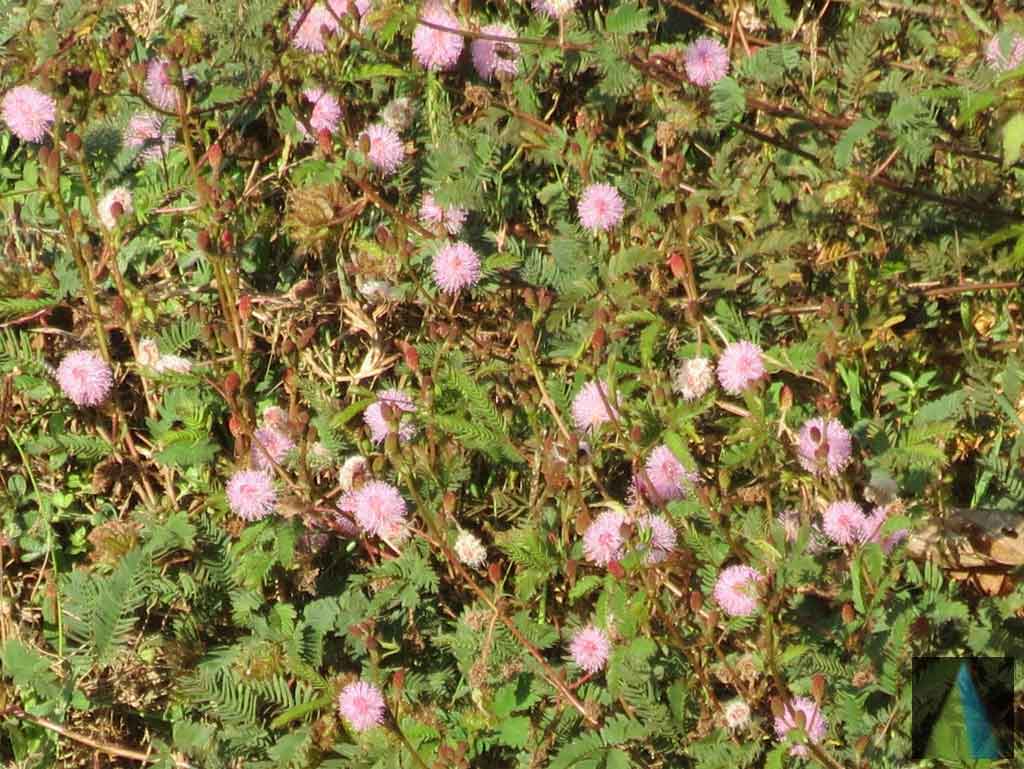
Vernacular names:
Assamese: Adori-bon, Lajuki-lata,Nilaji-bon
English: Humble plant, Sensitive plant, Touch Me Not, Shameful Plant
Shrinking Plant, Shy Plant, Sleeping Grass, Virgin Plant
Hindi: Chuimui, Lajwanti लाजवंतीIrula, Thotta sinungi, छुई-मुईKannada: Muttidare muni, Lajja
Malayalam: Theendarmani, Thottalvadi, Thottavadi
Bengali: Lajjabati
Manipuri : Kangphal, Ikaithabi
Assamese: NilajbanMalayalam: Tintarmani
Tamil: Thotta Surangi , தொட்டாச்சுருங்கிThottaccurungi
Brunei: puteri malu, rumput malu, sopan malu (Malay)
Indonesia: putri malu (general), jukut riyud (Sundanese), pis kucing (Javanese)
Malaysia: memalu, malu-malu
Papua New Guinea: matmat (Gunantuna, New Britain)
Philippines: makahiya (Tagalog), torog-torog (Bikol), babain (Ilokano)
Cambodia: smau bânla, bânkrap
Laos: f'a:z langab, th'üb nhub
Thailand: ka-ngap (peninsular), maiyaraap (central), yaa pan yot (northern)
Vietnam: cây mắc cở, cây xấu hổ, cây trinh nữ.
Plant Part - Mimosa pudica Whole plant
Mimosa pudica contains several phytochemicals that have been studied for their potential health benefits. Some of the phytochemicals found in Mimosa pudica include:
1. Flavonoids are antioxidant and anti-inflammatory properties. Several flavonoids have been identified in Mimosa pudica, including quercetin and kaempferol.
2. Alkaloids have a wide range of biological activities. Mimosa pudica contains several alkaloids, including mimosine, anabasine, and tryptamine.
3. Tannins have astringent properties used for their antibacterial and antiviral effects. Mimosa pudica contains several tannins, including catechins and epicatechins.
4. Saponins are detergent-like properties and can be used as natural emulsifiers. Mimosa pudica contains several saponins, including mimosinol and stigmasteryl glucoside.
5. Phenolic compounds have antioxidant properties and can protect against oxidative stress. Mimosa pudica contains several phenolic compounds, including chlorogenic acid and caffeic acid.
Mimosa Pudica (Touch-Me-Not) Whole Plant Powder
Remedies for
Wound healing: Mimosa pudica has been shown to have wound-healing properties due to its antioxidant and anti-inflammatory effects.
Gastrointestinal disorders: Mimosa pudica has been traditionally used to treat gastrointestinal disorders such as diarrhea, dysentery, and constipation.
Diabetes: Mimosa pudica has been shown to have antidiabetic properties by reducing blood glucose levels.
Respiratory disorders: Mimosa pudica has been traditionally used to treat respiratory disorders such as asthma, bronchitis, and coughs.
Skin disorders: Mimosa pudica has been traditionally used to treat skin disorders such as eczema and psoriasis.
Pain and inflammation: Mimosa pudica has been shown to have analgesic and anti-inflammatory effects, making it potentially useful for treating pain and inflammation.
PREVENTION
Antioxidant activity: Mimosa pudica contains flavonoids and phenolic compounds that have antioxidant properties. Antioxidants can help protect the body against oxidative stress, leading to a range of chronic diseases, including cancer and cardiovascular disease.
Anti-inflammatory activity: Mimosa pudica has been shown to have anti-inflammatory properties, which can help to reduce the risk of chronic inflammation-related diseases, such as diabetes and Alzheimer's disease.
Antimicrobial activity: Mimosa pudica contains several phytochemicals with antimicrobial properties, which can help to prevent and treat infections caused by bacteria, viruses, and fungi.
Immunomodulatory activity: Some studies suggest that Mimosa pudica may have immunomodulatory effects, which can help to enhance the immune system and reduce the risk of infectious diseases.
Directions to use:
Tea: Mimosa pudica POWDER brewed into a tea. This tea can be consumed for its potential health benefits, such as reducing blood glucose levels and treating respiratory disorders.
Poultice: A poultice can be made by Mimosa pudica BY ADDING WATER TO apply directly to the skin. This poultice can be used for its wound-healing properties or to treat skin disorders such as eczema or psoriasis.
Tincture: A tincture can be made by soaking Mimosa pudica whole plant powder in alcohol for several weeks. This tincture can be used for its potential anti-diabetic and anti-inflammatory effects.